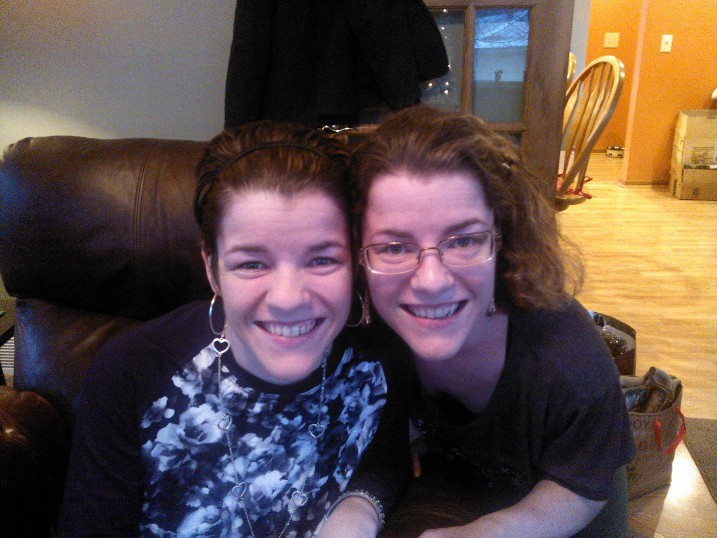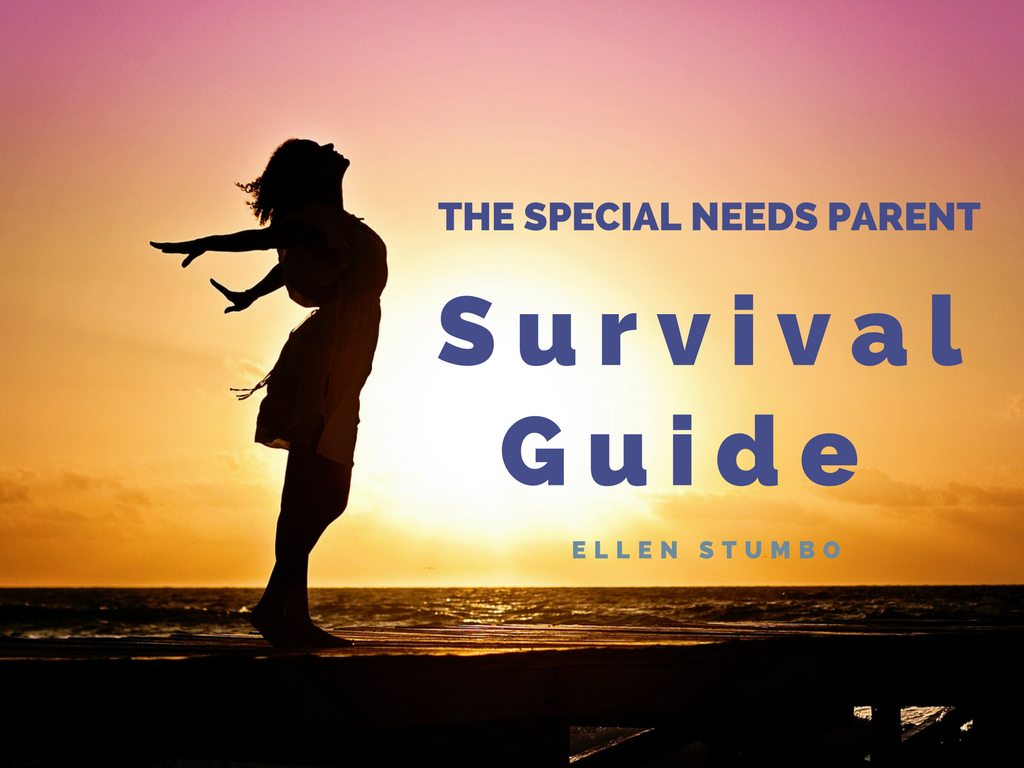Editor’s note: This is a guest post by Tonia Christle from Tonia Says for a blog series titled “Growing Up With a Disability.”
What happens when your child turns 18?
There aren’t a lot of resources for when kids with disabilities grow up.The only experience I can authentically share on this matter is my own. In this post, as with the others, I’ll do my best to pinpoint some things parents or family members can do when your child grows up.

COLLEGE AND KEEPING IN TOUCH:
Going to college was something I always knew I was going to do. In fact, back in second grade, I was sure it was a mandatory part of schooling. The first two years after high school, my sister and I lived at home and went to a local community college. I did well there academically. I had friends. I even had a job. Everything changed, though, when we moved an hour away from home to live on campus and attend a bigger university.
Getting to live away from home was exhilarating. It was also isolating, as I had trouble making friends, managing my finances, and getting to classes when snow plows inexplicably piled all of the snow in front of the curb cutouts. I struggled to find a job on this new campus. I even struggled with suddenly being aggressively romantically pursued by the men on campus who also used wheelchairs. One, who was twice my age, used to chase me in his power chair and block me when our paths crossed.
The thing that helped the most, though, were those out of the blue phone calls from my mom or little brother. The times my grandma came knocking at our dorm room at 9 AM on a weekend to take us out to eat or grocery shopping. Even if you think your college student is over having parents in their lives, trust that we still need you, and your presence is important, especially if your child is living away from home for the first time. Sending a card, or a care package, a Facebook message, or dropping by just to say hi reminds us that we are loved. It can make all the difference in the world.
BE SOMEONE YOUR CHILD CAN TALK TO ABOUT MENTAL HEALTH:
Mental health issues like anxiety and depression are more prevalent than ever, especially in college kids. Your son or daughter is not exempt from these. Part of my struggle at university was with these sorts of mental health issues.
I was torn between feeling driven to be perfect academically and being terrified to fail. I was exhausted and constantly felt like nothing I did would ever be enough. While many phone calls from my parents were welcome and appreciated, there were moments when I felt overwhelmed with anxiety and depression regarding their expectations. I felt nothing but pressure from myself, so any additional well meaning comments from my parents about what my plan was, or taking the test to get into my major felt like entirely too much to deal with.
There was mental health help available on campus but I was reluctant to seek it out. It wasn’t something my family talked about. Eventually, I did seek counseling with a friend as support, which made a big difference for me.
It was years before I felt I could open up to my mom about my struggle with anxiety and depression and when I did, her words surprised and (at the time) hurt me. She said, “You just have to keep moving forward.” However, as I’ve continued growing into adulthood, my mom’s words have proven to be some of the best advice I’ve ever gotten, and words that I refer to often, even a decade after the fact.
Talking to my mom about my struggle with anxiety and depression proved that I could open up to her and she would listen to me. Even if her advice wasn’t something I could stand to hear in the moment, it doesn’t mean it was not valuable.
Take your child’s mental health concerns seriously. Know that some can absolutely be surmounted with a little tough love but make sure your child also knows that things like needing medication or counseling are valid and acceptable options, too.
BE A SAFE HARBOR:
Home for the summer two years into four year programs, my sister and I were absolutely demoralized having run out of money for college. I had nearly failed a class that messed up my previously pretty okay GPA. We needed a break, and we found it with our aunt, uncle and cousins.
In the few years between quitting college and moving into accessible housing, our aunt and uncle’s home was a place where my sister and I could try to get ourselves together again, while knowing we were loved, accepted, and valued. Our cousins, who were 13 and 9 years old when we first moved in, were great mood-lifters. If ever our everyday life, financial issues, or the fact that we were college dropouts became difficult for us, we had our cousins there to lift our spirits, wanting to play board games, watch them dance or play sports, or just to hang out with them.
While living with my aunt and uncle, I healed. I regained the confidence and self esteem I had lost through the disaster that was the last two years of my college experience. Family members, don’t be afraid to be this safe harbor if your college kid needs a place to get themselves together, and if you have the means to take them in, know that it is something they will always remember and deeply appreciate. If you can’t take them in for whatever reason, be available when you can. Call them, write to them, make it clear you are on their side and you want the best for them.
It will make such a difference.
BE A RESOURCE:
 While living with my aunt and uncle, I was able to have hard but necessary conversations. I was able to get a handle on my college debt. My family were resources for me by way of handling my money, finding jobs and finding accessible housing.
While living with my aunt and uncle, I was able to have hard but necessary conversations. I was able to get a handle on my college debt. My family were resources for me by way of handling my money, finding jobs and finding accessible housing.
My mom was aware of an apartment building that was fully accessible that was also close to home (in the same city where my parents and aunt and uncle lived.) Though the waiting list was long, we eventually got a call that an apartment had opened up. Almost eleven years ago, they helped us move, even giving us some of their old furniture so we didn’t have to spend a huge amount on a couch. It is beyond amazing to live on my own (with my sister.) To be able to get everywhere I need to go in my apartment. To be able to use the bathroom safely. To be able to cook for myself and reach everything I need to reach.
Parents, even if it takes a while, know that whatever level of independence your child can achieve will be awesome for them. Be aware that no one survives completely on their own, because no single person knows absolutely everything there is to know. That’s why we have plumbers and electricians and carpenters. We all need help, and your child needing help to live on their own (or with you) is not a failure. Focus on the ways you can be there for your child along the way, and never lose confidence in what your child may achieve, given adequate time and support.
CLOSING THOUGHTS:
As family members, you are the most important people in your child’s life. Even as adults, we never stop needing your love and guidance. So, keep in touch with us if we are away at school, be someone we can talk to about our mental health, be a safe harbor or be a resource for us. These things will help us out tremendously.
“I know for sure that love saves me…” – Maya Angelou
***
 Tonia is a 30-something woman passionate about bridging the gap between disabled adults and parents of disabled children. She is also passionate about seeing a respectful representation of disability in the media. She blogs at Tonia Says, and you can best reach her at Tonia Says on Facebook.
Tonia is a 30-something woman passionate about bridging the gap between disabled adults and parents of disabled children. She is also passionate about seeing a respectful representation of disability in the media. She blogs at Tonia Says, and you can best reach her at Tonia Says on Facebook.
Special Needs Parents, Are You Surviving?
I created a guide with 13 practical ways to help you find peace in the midst of chaos, opt in to make sure you get a copy of this freebie!



LOVE this. I can relate so much.
I wish I could have read this post four years ago, when I was beginning my own college journey. College so far has been simultaneously one of the most difficult and one of the most amazing experiences in my life.
The exhilaration and isolation that you mention are (I think) common to many college students, but they’re amplified for those of us with disabilities. Being away at college has been one of the best things for me, as it’s really allowed me to develop my independence — but those first weeks in particular were H A R D.
And YESSS why do the snow plowers always seem to pile that snow in front of the curb cutout?!! S O frustrating.
Ohmygoodness though – that man who chased you sounds scary! What an invasion.
I wonder if your self-imposed pressure regarding your academic performance was, in part, a way to compensate for your physical difficulties. I know that this was the case for me…I felt that because I couldn’t match up with my peers physically, I had to excel academically. I know that this wasn’t a healthy mindset and it contributed hugely to my anxiety. If I did well, I didn’t give myself the credit I deserved (because I saw it as a way of “making up for” what I lacked with respect to my physical abilities), and if I didn’t do as well as I hoped, I felt worthless. I’ve think I’ve (mostly) managed to break free of this way of this mindset. I still maintain a huge focus on my academics and have no intention of changing that, but now I feel more proud about my successes and I can more easily forgive myself when I slip up.
I love what your mom said about having to move forward. When I first started college, I had never been more homesick in my entire life. I was physically exhausted from the orientation events with “ice-breakers” that catered to able-bodied individuals and alienated me from my classmates, anxious about succeeding, having trouble finding friends, having difficulty navigating campus and keeping up physically with everyone, and I was just emotionally DONE. And when I called my mom about it, she said something similar, that this was just a phase in my life and I had to “stick it out.” I’m so glad that I listened to her advice even if it was painful to hear at the time, because things got so much easier after I settled in and found an awesome friend group.
I love that your aunt and uncle were there to support you and your sister through the difficult times, and that you were successful, with their help, in finding an accessible place to live. Life plans can be more difficult when a disability is thrown into the mix, but you make such great points about a support system making all the difference…and you and your sister are a testament to that.
K, I wish you could have read this earlier on, too!
I wouldn’t be surprised if my drive to succeed academically was borne out of my insecurity regarding my disability at least in part. That seems to make a lot of sense.
I’m SO glad my mom said what she did. It has helped me so much in the years sine and I am glad that you were able to hear similarly needed advice from YOUR mom, too.
So grateful for our aunt and uncle. Having that as an option was SO necessary and appreciated. Thanks for all your supportive comments. I really appreciate them!